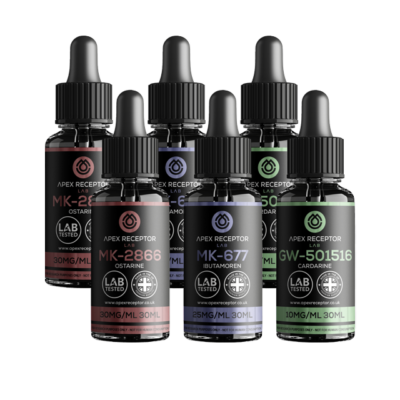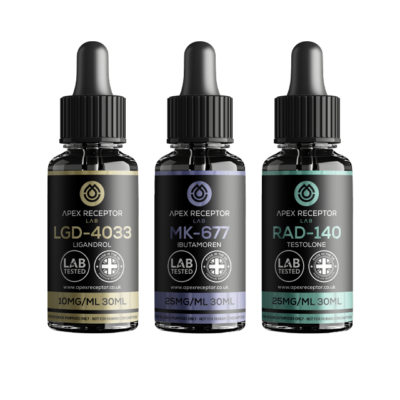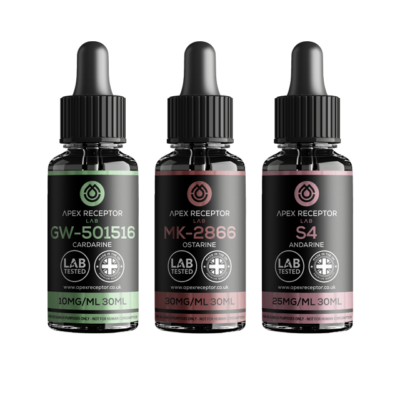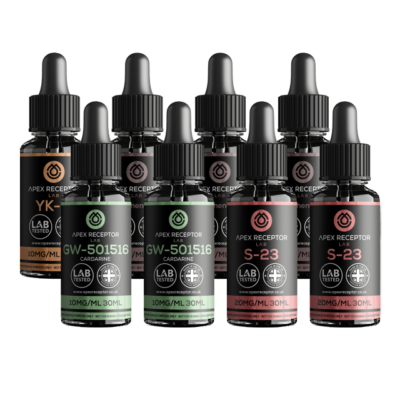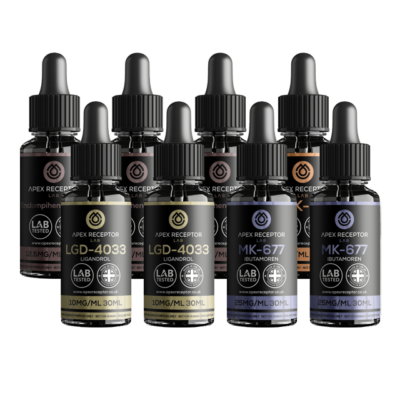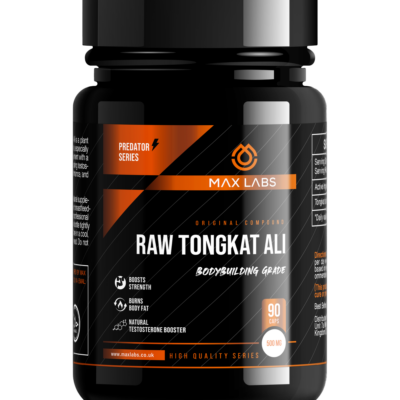Yes it’s possible! The idea that you can’t lose fat and gain muscle simultaneously is a myth.
There are loads of success stories within the fitness world – and many more outside of it – where bodybuilders and athletes have combined effective dieting with an intense training program to achieve their desired goals.
Having a healthy body composition reduces the risk of chronic diseases like heart disease, diabetes, and certain types of cancer, while also enhancing daily functionality and overall wellness. It helps to support strong bones and muscles, promotes better sleep and mood, and improves energy levels and cognitive functioning, fostering a higher quality of life.
What’s more, gym supplements like SARMs can help bodybuilders achieve their desired body composition by faster stimulating muscle growth and reducing fat without the widespread side effects associated with traditional anabolic steroids.
This guide will provide effective weight loss and muscle-building strategies, so you can join the list of success stories who’ve achieved fat loss while building their dream body.
Can You Lose Weight and Gain Muscle at the Same Time?
Weight loss and muscle gain are two of the most common fitness goals, but many people think you can only accomplish one at a time. But with the right approach, you can do both at once.
The key is to achieve what is known as “body recomposition.” This involves burning fat and building lean muscle at the same time. You can achieve this through exercise routines for weight loss and muscle gain, a properly planned diet, and gym supplements like SARMs which can accelerate the process.
What is the Best Way to Lose Weight and Gain Muscle?
Losing weight and gaining muscle requires two approaches:
- To shed extra pounds, you must be in a caloric deficit, which means consuming fewer calories than your body burns.
2. To gain muscle, you need to be in a caloric surplus, consuming more calories than you burn, to provide your body with sufficient energy and nutrients to build and repair muscle tissue.
When looking at how to lose weight but gain muscle, the answer lies in body recomposition. You’ll need to incorporate strength training and cardio workouts, and a healthy diet for weight loss and muscle growth into your routine to accomplish this.
Cardio burns calories and increases your daily energy expenditure. Conversely, strength training exercises such as lifting help build and maintain lean muscle mass. By combining the two exercises, you can lose fat and gain muscle.
Calorie intake is also crucial to reaching your goals. A moderate calorie deficit of around 500 calories a day is ideal. You’ll be in a caloric deficit to promote fat loss but still have the energy and nutrients for muscle growth.
To see results faster, you’ll also need to consider diet supplementation. The most popular supplements for booking and cutting are Selective Androgen Receptor Modulators (SARMs).
They directly stimulate muscle cells to encourage testosterone production and boost endurance, stamina, and speed. They also encourage strength gains and lean muscle growth safely and effectively, which is also known to increase libido and improve cardiovascular health.
The Role of Nutrition in Achieving Your Dream Body Composition
Achieving a body composition transformation requires more than just exercise. Nutrition plays a vital role in reaching your fitness goals. Whether you’re trying to lose weight, gain muscle, or both, consuming the right type and amount of nutrients is crucial.
First, it’s essential to understand that there is no one-size-fits-all approach to nutrition. Every person’s body is unique, and their nutritional needs vary based on age, gender, weight, and lifestyle. However, one thing that remains constant is the importance of a balanced diet and exercise plan.
A balanced diet includes a variety of food groups, such as fruits, vegetables, lean proteins, whole grains, and healthy fats. Each food group provides your body with essential vitamins, minerals, and macronutrients. Macronutrients are the nutrients your body needs in large quantities, such as carbohydrates, protein, and fat.
You may need to adjust your macronutrient intake depending on your fitness goals. For example, to lose weight, you should focus on consuming fewer calories than your body burns every day. This can be achieved by reducing carbohydrate and fat intake while increasing protein intake. Protein helps keep you full and satisfied and helps preserve lean muscle mass while in a calorie deficit.
On the other hand, if you’re trying to gain muscle, you’ll need to consume more calories than your body burns to support muscle growth. In this case, consuming adequate amounts of protein, carbohydrates, and fat is vital to provide your body with the energy and nutrients it needs to build new muscle tissue.
It’s also essential to pay attention to the quality of your calories and not just the quantity. Foods with added sugars, saturated fats, and refined carbohydrates should be limited. Instead, focus on whole, nutrient-dense foods that fuel your body properly.
How Exercise Can Help
Fitness and nutrition go hand-in-hand with any body composition goals. Incorporating workouts to lose weight and gain muscle into your routine is essential. Exercise burns calories and fat and builds lean muscle mass, which can help boost your metabolism and aid in weight loss.
Resistance training is one of the most efficient types of exercise for weight loss and muscle gain. This exercise involves using weights, resistance bands, or body weight to build strength and endurance. Strength training stimulates muscle growth, which helps you build lean muscle mass and increase your metabolism.
Cardio exercise is also essential for weight loss and muscle gain. Activities like running, cycling, and swimming can help burn calories and improve cardiovascular health, aiding in weight loss and overall fitness. Additionally, aerobic exercise can help create a calorie deficit necessary for weight loss.
What to Eat to Lose Weight and Gain Muscle
To lose weight and gain muscle, focus on a balanced diet rich in high-quality proteins such as lean meats, fish, eggs, dairy, and plant-based sources like legumes and quinoa to support muscle growth and recovery.
Incorporate a variety of fruits, vegetables, and whole grains to provide necessary vitamins, minerals, and fibre, and limit processed foods and added sugars.
Healthy fats from avocados, nuts, seeds, and olive oil can also support overall health. For weight loss, ensure you’re eating at a calorie deficit, which means consuming fewer calories than your body uses daily.
Here’s a list of nutrient-rich foods that can support both weight loss and muscle gain:
Protein-rich Foods:
- Lean meats (chicken, turkey)
- Fish (salmon, tuna)
- Eggs
- Full-fat dairy like Greek yoghurt
- Cottage cheese
- Legumes (lentils, chickpeas, black beans)
- Quinoa
- Tofu
- Protein shakes
Carbohydrates:
- Whole grains (brown rice, oatmeal, whole grain bread, quinoa)
- Sweet potatoes
- Bananas
- Berries
- Apples
- Leafy greens (spinach, kale)
Healthy Fats:
- Avocados
- Nuts (almonds, walnuts, pistachios)
- Seeds (chia seeds, flaxseeds)
- Olive oil
- Fatty fish (salmon, mackerel)
A high-protein diet for weight loss and muscle gain can help promote satiety, fuel your workouts, and support muscle recovery and growth. Remember, it’s not just about what you eat, but also portion control and the balance and timing of meals.
How many calories should you consume to lose weight and gain muscle?
If you want to transform your body composition by losing weight and gaining muscle, the key is to balance your calorie intake and expenditure. To achieve this balance, it’s essential to understand how many calories your body needs to function correctly and support your fitness goals.
First, calculate your basal metabolic rate (BMR), the number of calories your body burns at rest to maintain normal bodily functions like breathing, circulation, and digestion. This can be estimated using an online calorie calculator based on age, gender, weight, and height.
Next, factor in your activity level to determine your total daily energy expenditure (TDEE). This includes the calories you burn during exercise and other physical activities. An online TDEE calculator can estimate this number based on your BMR and activity level.
Once you have determined your TDEE, you can create a calorie deficit to promote weight loss while providing your body with enough energy and nutrients to support muscle growth. A safe and effective caloric deficit for most people is around 300 to 500 calories per day, which can result in a weight loss of 1 to 2 pounds per week.
Consuming too few calories can hinder your progress by slowing your metabolism and causing muscle breakdown. To prevent this, aim for a protein intake of 1 to 1.5 grams per pound of body weight and include carbohydrates and healthy fats in your diet.
When it comes to gaining muscle, eating enough calories to support muscle growth is essential, but not so many that you gain excess body fat. A caloric surplus of 250 to 500 calories per day is recommended for muscle gain, combined with heavy resistance training for muscle development.
Are There Supplements to Lose Weight and Gain Muscle?
SARMs can be stacked together to help you to lose fat and gain muscle:
1. Ostarine and Cardarine Stack: Ostarine, also known as MK-2866, is great for building strength and lean muscle mass and is an excellent bulking SARM. Cardarine, or GW-501516, is not actually a SARM but is often used in conjunction with them due to its ability to boost fat loss while providing energy boosts.
2. Stenabolic and Ligandrol Stack: Stenabolicaid boosts fat loss by influencing the body’s circadian rhythms and metabolic processes, while Ligandrol (LGD-4033) is a potent lean mass builder and strength booster. Together, they can provide significant muscle growth and fat loss.
3. Ostarine, Cardarine, and Andarine Stack: This is a popular cutting stack. Andarine (S4) has fat-burning effects, and Ostarine is known for preserving lean muscle mass during a caloric deficit. Cardarine can boost fat loss and provide energy.
Use the weight loss and muscle-building tips in this article alongside these supplements, and you’ll see results much faster.
Always consult with a healthcare professional before beginning any new supplement regimen, particularly something as potent as SARMs, and remember that achieving your fitness goals will also require a healthy diet and regular exercise.


